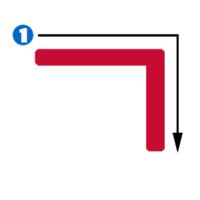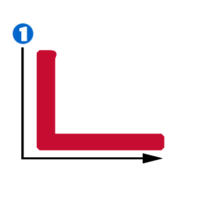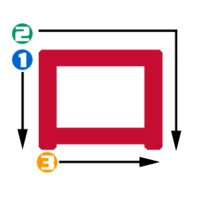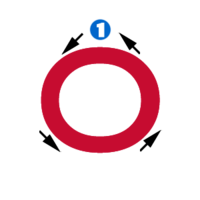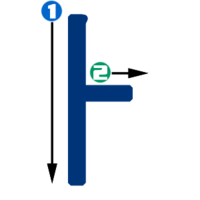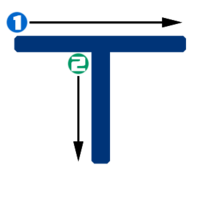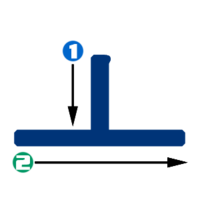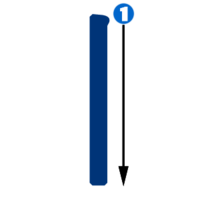Hangeul step 2\ar
|
|
| Help · Cheat Sheet · Community portal |

|

|
Did you jump to step 2?
Did you skip step 1 because you were eager to just start learning the alphabet? Don't do it! We recommend you you go back to step 1 and read the general information on Hangeul, there are some important details that will help you from being confused later.
Introduction

We will introduce a consonant and vowel in pairs since consonants cannot be pronounced without the help of a vowel. Steps 2 through 4 are all either a consonant paired with a horizontal vowel or a consonant paired with a vertical vowel.
In this lesson, you will learn:
Also note that some of these files are set to loop, so you must manually stop the files yourself.
Step 2
|
| ||||||||||
 This is a vertical vowel and written to the right of the consonant. Think of the <a> in <art> or the French <a> in <ami>. IPA symbol: /a/. For full information about this letter, see ㅏ.
|
 This is pronounced like a mix between a G and a K at the beginning of a word. It is unvoiced like a K, but unaspirated like a G. Think of the <k> in <skill>. However, when found between vowels, the sound is voiced and makes a /g/ sound. IPA symbol: /k/ /g/. For full information about this letter, see ㄱ. | ||||||||||
| Practice | |
|---|---|
| 가 | |
|
| ||||||||||
 This sound makes an "ooh" sound, similar to 'moon' or 'blue' or the U sound in Spanish (i.e. usted in "usted"). This is a horizontal vowel and written below the consonant. IPA symbol: /u/. For full information about this letter, see ㅜ.
|
 This sound is the same as the N sound in English. IPA symbol: /n/. For full information about this letter, see ㄴ. | ||||||||||
| Practice | |
|---|---|
| 누 | |
| 나 | |
| 구 | |
|
| ||||||||||
 Think of the Canadian or Scottish O. Many speakers do not say aw-oo or o-oo like Americans and do not say ay-oo like Londoners. This is a straight "o" sound, tight but not as tight as the ㅜ. This is a horizontal vowel and written below the consonant. IPA symbol: /o/. For full information about this letter, see ㅗ.
|
 This sound is the same as the M sound in English. IPA symbol: /m/. For full information about this letter, see ㅁ. | ||||||||||
| Practice | |
|---|---|
| 모 | |
| 마 | |
| 무 | |
| 고 | |
| 노 | |
|
| ||||||||||
 This sound is similar to the 'ee' sound in 'see' or 'free.' A little quicker though, more like the <y> in <happy> but not the Scottish "happay." This is a vertical vowel and written to the right of the consonant. IPA symbol: /i/. For full information about this letter, see ㅣ.
|
 This is pronounced like a mix between the sounds of a T and a D at the beginning of a word. It is voiceless like a T and unaspirated like a D. Think of the <t> in <stop>. However, when found between vowels, the sound is voiced and makes a /d/ sound. IPA symbol: /t/ /d/. For full information about this letter, see ㄷ. | ||||||||||
| Practice | |
|---|---|
| 디 | |
| 다 | |
| 두 | |
| 도 | |
| 기 | |
| 니 | |
| 미 | |
| ||||
 ㅇ represents no sound when found in the initial position of a syllable. Instead, it simply acts as a placeholder since vowels cannot be written by themselves. However, if ㅇ is in the final (bottom) position, it makes an NG sound, eg 'sing' or 'wrong', but these final position sounds will not be discussed until step 5 of this lesson. For now, think of it as a placeholder for a consonant when only a vowel sound must be written. IPA symbol: /./ /ŋ/. For full information about this letter, see ㅇ. | ||||
| Practice | |
|---|---|
| 아 | |
| 우 | |
| 오 | |
| 이 | |
Real Examples
| Word | Audio |
|---|---|
| 가구 (furniture) | |
| 가나다 (Korean alphabet, i.e. abc) | |
| 가다 (to go) | |
| 가두다 (to lock in) | |
| 고구마 (sweet potato) | |
| 고기 (meat) | |
| 고모 (father's sister) | |
| 구두 (dress shoes) | |
| 기도 (prayer) | |
| 나가다 (go out) | |
| 나누다 (to divide) | |
| 나무 (tree) | |
| 나오다 (to come out) | |
| 나이 (age) | |
| 누가 (who) | |
| 누구 (who) | |
| 누나 (older sister) | |
| 다가가다 (approach to someone) | |
| 다니다 (to go to, work, school etc) | |
| 도구 (instrument,tool) | |
| 마다 (every) | |
| 마디 (joint, knot) | |
| 모기 (mosquito) | |
| 아기 (baby) | |
| 아마도 (maybe,perhaps) | |
| 아우 (man's younger brother-but not used anymore) | |
| 아이 (child) | |
| 오다 (to come) | |
| 오이 (cucumber) | |
| 이기다 (to win) | |
| 이모 (mother's sister) |
Writing
Characters are written in a certain stroke order. Korean letters are written left to right, top to bottom. Remember stroke order is important, so please practice.
Video
Watch this lesson on talktomeinkorean.com's youtube channel:

|

|

